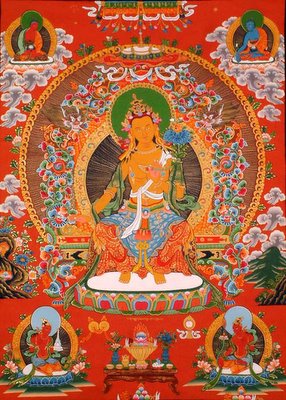The latest offering from Harris is an article in the March 2006 Shambhala Sun, "Killing the Buddha." In this piece, Harris argues (much as Ken Wilber did in The Marriage of Sense and Soul) that meditative science must be stripped of its religious clothing for it to become a universal tool available to all. He feels that the "wisdom of the Buddha is currently trapped within the religion of Buddhism."
In many respects, Buddhism is very much like science. One starts with the hypothesis that using attention in the prescribed way (meditation), and engaging in or avoiding certain behaviors (ethics), will bear the promised result (wisdom and psychological well-being). The spirit of empiricism animates Buddhism to a unique degree. For this reason, the methodology of Buddhism, if shorn of its religious encumbrances, could be one of our greatest resources as we struggle to develop our scientific understanding of human subjectivity.I agree completely. BUT, this will only apply to those who have reached the rational, self-interest stage of development (otherwise known as Orange--see this pdf for a brief introduction to Spiral Dynamics).
Harris is so enraptured with his scientism that he cannot fathom any other possible worldviews. He has in fact gone so far as to argue that his atheistic stance is not a worldview. One of the traits of all first-tier memes is their built-in virus protection against other worldviews--for Orange it is the assumption that only rational, logical thought can have value. For Harris, anything pre-rational or post-rational is simply irrational, and therefore worthless.
This viewpoint ignores the reality that human beings develop from pre-rational to rational to post-rational/integral. Arguing that only a rational approach to Buddhism has any validity will mean nothing to a person still living within a pre-rational worldview (these are the people Harris seems to detest, especially the Christian and Islamic believers); likewise, it will just seem silly to someone who is post-rational/integral.
 The Buddha understood this. He developed a variety of teaching techniques (Reginald Ray: "By the time of his death ... the Buddha had developed 84,000 different methods of transmission of the awakened state.") in order to convey his wisdom to his students. Buddha recognized that each person, or type of person, would need to have the teaching presented in a way that was accessible from their life conditions, from their worldview.
The Buddha understood this. He developed a variety of teaching techniques (Reginald Ray: "By the time of his death ... the Buddha had developed 84,000 different methods of transmission of the awakened state.") in order to convey his wisdom to his students. Buddha recognized that each person, or type of person, would need to have the teaching presented in a way that was accessible from their life conditions, from their worldview.This is why Buddhism does not need to be stripped of its religion. To do so would be to abandon all the pre-rational peoples of the world who are Buddhist (most followers fit this category).
Buddhism can speak to all the various worldviews: as people move up the developmental Spiral, either in this lifetime or those to come, they will move from petitionary worship of Buddhist dieties, to strict adherence of the practices and ethics of Buddhism, to a rational appreciation of the benefits of meditation, to an embrace of loving-kindness and tonglen practice, and finally to an integral understanding that gives respect and legitimacy to all of these various manifestations of Buddhist practice.
Buddhism should be an inclusive religion. If Harris were to have his way--and he won't--Buddhism would become another insular practice that does not admit the full-spectrum of humanity or human experience.
[Maitreya: The Future Buddha]
2 comments:
I see your point about Mr. Harris. But I will say this, he is much more open to the "Buddhist Possibility" than other atheists. You must give him credit for that. He does not just dismiss, like some other sceptics that I have read. I think his "scientific" way of thinking and expressing is just his personality.
Check my blog @ apanage21.blogspot.com - Arthur.
i hope, in his relative open-mindedness, mr. harris doesn't fall into the same fallacy as mr. wilber does, that the buddha, jesus, mohammed, etc., all taught the same thing, and only our first-tier memes keep them separate. wilber's clinging to the insidious and easily discounted romantic, relativistic, 'perennial philosophy' seriously undermines integral theory as a whole.
Post a Comment